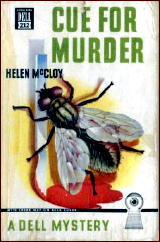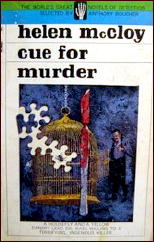Sat 21 Jan 2017

HELEN McCLOY – Cue for Murder. William Morrow, hardcover, 1942. Reprint editions include: Dell #212 , paperback, [1948], mapback edition; Bantam, paperback, 1965.
The opening two paragraphs establish the parameters of this finely clued detective puzzler in a most excellent fashion:
The fly discovered the chemical evidence that so impressed the jury at the trial, but the canary provided a psychological clue to the murderer’s identity before the murder was committed. Basil Willing is still troubled by the thought that it might have been prevented if he had read the riddle of the canary sooner.

Dr. Basil Willing, who over the years appeared in 13 of author Helen McCloy’s 29 novels and short story collections, at this time of his career, extending from 1938 to 1980, was officially a medical assistant to the District Attorney’s office in New York City, specializing in psychiatry. And yes, the statement in the paragraphs above is true, given a very basic concept in pop psychology.
Dead is an unknown actor playing a dying man during the opening of a Broadway play. When the first act is done, he is discovered to be really dead, and only three people on stage could have done the deed. Even with the finest of timetables, what should be an easy task in narrowing three down to one proves not to be so easy — not without the fly and the canary.
As finely clued as this story is, Cue for Murder is even more notable for the details of what goes on behind the scenes of a Broadway play, both before the curtain goes up and while the actors go through their night after night routines. As the author, Helen McCloy not only knew what separates a good (or only fair) actor from a great one, but how to put the knowledge into words so that even a layman like myself could tell the difference as well, and get a satisfying sense of recognition in doing so.
I read the Bantam reprint paperback, which adds an introduction by Anthony Boucher, who praise for the book I can only echo. I enjoyed this one.
January 21st, 2017 at 11:24 am
Helen McCloy is one of the major American writers of mystery fiction. People who read her tend to like her. But as a whole she doesn’t have the audience today she deserves.
McCloy had a relentlessly curious mind. Her fiction is full of ideas on every possible subject. As Steve points out, she had the analytic skills to generate insights into subjects, like the theater in this novel, and the literary skills to share those ideas with her readers.
A good review!
January 21st, 2017 at 12:02 pm
Steve – Here’s one for you. How many mysteries (written or filmed) use a fly or flies as a clue in the solution? I can think of only one other one, reviewed here:
https://mysteryfile.com/blog/?p=11859
January 21st, 2017 at 1:16 pm
Thanks for the reminder link, Mike. I’d forgotten about that story, an episode of the old PERRY MASON TV show.
I can’t think of any other mystery story involving ordinary house flies as important clues either.
January 17th, 2019 at 4:02 pm
Another Mystery*File review of this book: https://mysteryfile.com/blog/?p=32003
August 1st, 2023 at 2:09 pm
Not flies–but Fly Paper was the key to Hammett’s eponymously named story.